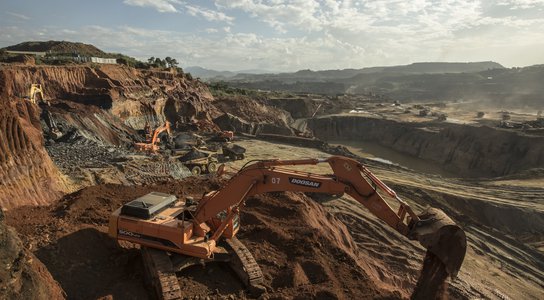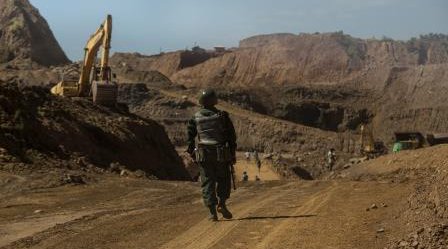Myanmar’s first ever disclosure of beneficial ownership information is an important step forward for the troubled oil, gas, gemstone and mining sectors, but major problems with the data must be addressed, new analysis by Global Witness shows.
Myanmar has taken a critical step in the fight against corruption by collecting and publishing information on beneficial ownership in Myanmar’s troubled extractive industries, revealing who controls many lucrative oil, gas and mining companies. However, the government needs to fix several problems in the published data and companies need to take their disclosures seriously for the information to deliver on its promise, Global Witness shows in its new report, Out of the Shadows, released today.
Accurate beneficial ownership information is particularly valuable in Myanmar’s extractive industries, where opaque networks of companies connected to the military, ethnic armed groups, and crony businessmen have long dominated this lucrative part of Myanmar’s economy. Beneficial ownership disclosure requirements have the potential to cut through this fog and reveal who is really behind these companies.
The world was given a stark reminder of Myanmar’s need for improved extractive sector governance when around 200 miners were killed in a landslide in Myanmar’s jade mining capital of Hpakant. This disaster looks set to be the deadliest of its kind on record but unfortunately it is not a one-off, with similar incidents occurring every year. As with all of these jade landslides, last week’s devastating tragedy was a preventable tragedy that was made possible by theMyanmar government continuing to turn a blind eye to illicit and rapacious mining practices.
Global Witness has campaigned for years to bring accountability to Myanmar’s extractives sector, and transparency around ownership is critical to this. Yet our analysis of the first set of beneficial ownership data reveals that this project remains incomplete. Over one-third of the companies required to submit information filed inaccurate data, did not file at all or filed late. This includes multiple companies that failed to disclose their beneficial owners as “politically exposed persons” – prominent public figures and their associates who could abuse their positions to conceal payments and facilitate corruption.
”High-quality and publicly accessible data on who controls the country’s extractive sector is crucial for local businesses and international investors to understand who they are doing business with. It also helps Myanmar’s civil society organisations, media, and citizens to interrogate who is really profiting from some of the country’s most lucrative companies and to hold the powerful to account,” said Paul Donowitz, Myanmar Campaign Leader at Global Witness.
Crucially, the lack of transparency in the extraction of natural resources in resource-rich ethnic regions helps perpetuate and finance violent conflict in these areas. Global Witness has previously exposed how the multi-billion dollar jade trade in Kachin State is controlled by companies with links to military officials and other armed groups, for example.
Moreover, the military’s role in the widely reported ethnic cleansing against the Rohingya in Rakhine State and abuses committed against ethnic communities in Kachin, Northern Shan States and other ethnic minority areas has urgently demonstrated the need for a better understanding of the nature and scale of the military’s economic interests.
While eight companies declared that one or more of their owners was politically exposed, Global Witness has identified a further ten that have potentially undisclosed political ties. This is likely to be just the tip of the iceberg.
One emblematic case study in our analysis is the disclosure by Myanma Economic Holdings Public Company Limited (MEHL), which maintains ownership stakes in some of the most profitable businesses in the country, such as Myanmar Brewery and Myawaddy Bank. It also controls numerous jade-mining subsidiaries, including the largest license-holder in the country at the time of the 2016 licensing suspension, Myanmar Imperial Jade. There are several inaccuracies and concerns with the beneficial ownership data MEHL submitted, including that its filing fails to disclose its legal shareholders and the fact that none of the three declared beneficial owners are listed as PEPs, despite their status as current and former high-ranking military officials.
These failures are even more relevant in the wake of the government’s appointment of a member of the military, Home Affairs Minister Lt. General Soe Htut, to the panel investigating the July 2nd landslide in Hpakant. With the military’s extensive interests in the jade-mining industry, this already is an institutional conflict of interest. It may be a personal one as well. MEHL’s failure to report its shareholders means that we cannot say with any certainty whether Lt General Soe Htut has any direct interests in the company. However, given that the company’s stock is known to be held by high-ranking military officials, it is possible that Lt. General Soe Htut has substantial holdings in MEHL, which would be an egregious conflict of interest. Ownership disclosure matters.
Global Witness is calling on Myanmar’s government to ensure compliance through measures such as withholding operating licenses from non-compliant companies, suspending or revoking their licences, or imposing fines.
“Ultimately, a beneficial ownership register is only useful if the information it contains is accurate. To ensure data accuracy, there must be incentives for compliance and clear consequences for companies that fail to file accurate beneficial ownership information,” said Mr. Donowitz.
/ ENDS
Contacts
You might also like
-
Briefing Out of the shadows
Myanmar’s first ever disclosure of beneficial ownership information is an important step forward for the troubled oil, gas and mining sector, but major problems with the data must be addressed
-
Briefing မှောင်ရိပ်ကိုခွာ၍
An analysis of Myanmar’s first beneficial ownership disclosures